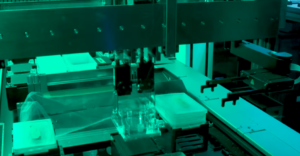APPLICATIONS OF TECHNOLOGY:
- EcoBOT automates multiple simultaneous sterile biological experiments.
- It screens novel plant amendments for effectiveness under various conditions and for potential biohazards.
- It consistently identifies the impact of various amendments on plant root and leaf traits at various stages of growth.
- It can parse the effects of multiple variables, such as fertilizers or soil microbes, to identify optimal growth conditions in specific scenarios.
- EcoBOT allows for AI-controlled experiments.
BENEFITS:
- Experiments can easily scale
- Experiments are low cost
- Automation allows simultaneous, low-error exploration of the variable space to determine optimal growth conditions
- Experiments can be designed and carried out entirely remotely and by automation
- Small lab footprint
- Sterile, single-plant environments with visible access to the roots during growth
BACKGROUND:
- EcoFABs are precisely controlled and sterile compartments in which researchers conduct replicable laboratory experiments to study microbiomes using small plant and microbe growth chambers.
TECHNOLOGY OVERVIEW:
Researchers at Berkeley Lab have developed the EcoBOT, which combines a customized plant growth chamber currently designed for EcoFAB units, with a liquid handling unit that can sample the root chamber of the EcoFAB. It can also add nutrients, chemicals, or microorganisms to determine the impact of the plant.
Ecobot is: 1) designed to work with EcoFABs, which are controlled environments for plants and contrast with other systems that are otherwise open to the environment, 2) a compact system where the growth chamber, sampling system, and imaging are all within a single 2m3 unit, and 3) a system that can be used to explore how multiple variables—such as microbial composition or fertilizers—affect multiple other variables, such as root growth and soil carbon. This last feature allows EcoBOT to identify trends and optima which provide researchers with insight about how variables affect plant growth.
The EcoBOT has imaging capabilities that currently include a scanning inverted microscope to microbial colonization and root growth, as well as a hyperspectral camera to image plant biomass. Additional modules will soon be capable of determining the spatial distribution of chemical compositions and concentrations. Since all elements are contained within a single system and all components can be controlled via software, the EcoBOT is capable of performing experiments guided by AI in closed-loop automation.
DEVELOPMENT STAGE: Proven principle; partnerships for field-testing under development
FOR MORE INFORMATION:
https://fabricatedecosystems.lbl.gov/
PRINCIPAL INVESTIGATORS:
- Peter Andeer
- Thomas Vess
- Lloyd Cornmesser
- Trent Northen
STATUS: Patent pending.
OPPORTUNITIES: Available for licensing or collaborative research.
SEE THESE OTHER BERKELEY LAB TECHNOLOGIES IN THIS FIELD:
EcoFAB 2.0: Device for Determining Plant-Microbe Interactions 2019-066
